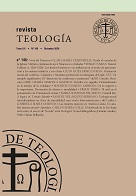Older Women in Latin America. An Intersectional Analysis
DOI:
https://doi.org/10.46553/teo.61.145.2024.p245-268Keywords:
Older People, Intersectionality, Ageism, Gender, BodyAbstract
The number of older people in the world continues to rise. Within this population, the study of older women is an emerging field of research. From a gender perspective, the inequalities faced by older women in Latin America and the Caribbean are analyzed. The subordination of women in various indicators of quality of life is evidenced, resulting in a profound inequity in terms of health, well-being and access to the rights of older women. They face intersectional discrimination; in this sense, the concept of ageism, which encompasses stereotypes, prejudices and discrimination towards people based on their age, is addressed. The concept of intersectionality provides an enriching focus for theological ethics by addressing the understanding of the older subject from the perspective of the complexity and interconnectedness of human experiences. The text also explores the relationship between the female body and cultural and social exigencies, noting how historical discourses have shaped the perception of women's bodies. The problematic of the invisibility and hypervisibility of older women's bodies is highlighted, as well as the social and market demand to sustain a youthful body.
Downloads
References
Applewhite, Ashton. This chair rocks. A manifesto against ageism. New York: Celadon Books, 2019. E-Book.
Belle, Deborah y Joanne Doucet. «Poverty, Inequality, and Discrimination as Sources Of Depression Among U.S. Women». Psychology of Women Quarterly 27 (2003): 101-113, doi:10.1111/1471-6402.00090
Benitez Ana Clara. «El cuerpo entre el lenguaje y el goce». En Cuerperios. Miradas polifónicas sobre el cuerpo en la época actual, coord. Luisina Bourband, 13-42. Rosario: Laborde Editor, 2020.
Calasanti, Toni. «Ageism, Gravity, and Gender: Experiences of Aging Bodies». Generations 29, n. 3 (2005): 8-12, file:///C:/Users/Usuario/Downloads/AgeismGravityandGender.pdf
Cardona Arango, Doris y Enrique Peláez. «Envejecimiento poblacional en el siglo XXI: oportunidades, retos y preocupaciones». Salud Uninorte 28, n. 2 (2012): 335-348, http://www.scielo.org.co/pdf/sun/v28n2/v28n2a15.pdf
Cobo Bedia, Rosa. «El cuerpo de las mujeres y la sobrecarga de sexualidad». Investigaciones Feministas 6 (2015): 7-19, doi:10.5209/rev_INFE.2015.v6.51376
Comisión Económica para América Latina y el Caribe. Observatorio Demográfico, 2013. Santiago de Chile: Naciones Unidas, 2014. https://www.cepal.org/es/publicaciones/36854-observatorio-demografico-america-latina-caribe-2013-proyecciones-poblacion
Comisión Económica para América Latina y el Caribe. Envejecimiento en América Latina y el Caribe: inclusión y derechos de las personas mayores. Santiago: Naciones Unidas, 2022 https://www.cepal.org/es/publicaciones/48567-envejecimiento-america-latina-caribe-inclusion-derechos-personas-mayores
Crenshaw, Kimberlé. «Mapping the Margins: Intersectionality, Identity Politics, and Violence against Women of Color». Stanford Law Review 43, n. 6 (1991): 1241-1299, https://blogs.law.columbia.edu/critique1313/files/2020/02/1229039.pdf
Daly, Mary. Gyn/Ecology: The Metaethics of Radical Feminism. Boston: Beacon Press, 1990.
Del Popolo, Fabiana, ed. Los pueblos indígenas en América (Abya Yala): desafíos para la igualdad en la diversidad. Santiago: Naciones Unidas, 2017. https://www.cepal.org/sites/default/files/publication/files/43187/S1600364_es.pdf
Di Renzo, Gabriela. «Interseccionalidad. Aportes a la ética teológica». Estudios Eclesiásticos 98, n. 386 (2023): 443-468, doi: 10.14422/ee.v98.i386.y2023.001
Duncan, Colin y Wendy Loretto «Never the Right Age? Gender and Age-Based Discrimination in Employment» Gender, Work and Organization 11, n. 1 (2004): 95-115, doi: 10.13128/SMP-23439
Fernández, Inés. «Medicina y poder sobre los cuerpos». Thémata. Revista de Filosofía 33 (2004):191-198, https://institucional.us.es/revistas/themata/33/21%20fernandez.pdf
Freixas Farré, Anna. «La vida de las mujeres mayores a la luz de la investigación gerontológica feminista». Anuario de Psicología 39, n. 1 (2008): 41-57, https://www.redalyc.org/pdf/970/Resumenes/Resumen_97017401004_1.pdf
Gaona, Melina. «Interseccionalidades: alcances de la teoría y versiones de la práctica política en el presente». Revista electrónica de estudios latinoamericanos 76 (2021): 71-89, https://www.redalyc.org/articulo.oa?id=496466925006.
Gendron, Tracey L., E. Ayn Welleford, Jennifer Inker, John T. White. «The Language of Ageism: Why We Need to Use Words Carefully». The Gerontologist (2015): 1-10, doi:10.1093/geront/gnv066
Gonzalvez Torralbo, Herminia. «Género, cuidados y vejez: mujeres “en el medio” del trabajo remunerado y del trabajo de cuidado en Santiago de Chile». Revista Prisma Social 21 (2018):194-218, https://revistaprismasocial.es/article/view/2445
Hill Collins, Patricia. Black feminist thought:knowledge, consciousness, and the politics of empowerment. 2.ª ed. New York: Routledge, 2000.
Huenchuan, Sandra, ed. Envejecimiento, personas mayores y Agenda 2030 para el Desarrollo Sostenible: perspectiva regional y de derechos humanos. Santiago: Naciones Unidas, 2018. https://repositorio.cepal.org/bitstream/handle/11362/44369/1/S1800629_es.pdf
Jaggar, Alison M. «Ética feminista». Debate Feminista 49 (2014): 8-44, https://philpapers.org/rec/JAGTF-2
Kim, Grace Ji-Sun y Susan M. Shaw. Intersectional Theology. Minneapolis: Fortress Press, 2022. E-Book.
Klein, Alejandro. «Tercera edad empoderada y cultura urbana expulsiva en Latino América». SocietáMutamentoPolitica 9, n. 17 (2018): 271-286, doi.org/10.13128/SMP-23439
Krekula, Clary, Pirjo Nikander, Monika Wilińska. «Multiple Marginalizations Based on Age: Gendered Ageism and Beyond». En Contemporary Perspectives on Ageism. International Perspectives on Aging 19, ed. Liat Ayalon y Clemens Tesch-Römer. Cham: Springer, 2018. E-Book.
Levy, Becca. Breaking the Age Code. How Your Beliefs About Aging Determine How Long and Well You Live. New York: William Morrow, 2022. E-Book.
López Cantos, Francisco. «Envejecimiento, ciencia y publicidad de cosméticos. La eternidad en una gota de crema». Revista de Comunicación Vivat Academia 135 (2016): 41-56, http://www.redalyc.org/articulo.oa?id=525755343004
Matsuda, Mari J. «Beside My Sister, Facing the Enemy. Legal Theory out of Coalition». Stanford Law Review 43, n. 6 (1991): 1183-1192, doi:10.2307/1229035
Navarro, Mónica. «Viejas en el género». En La gerontología será feminista, comp. Paula Danel y Mónica Navarro. Paraná: La Hendija, 2019.
Organización Mundial de la Salud. Informe mundial sobre el envejecimiento y la salud. OMS, 2015. WHO/FWC/ALC/15.01
Organización Mundial de la Salud. Informe mundial sobre el edadismo. OMS, 2021a. Doi: 10.37774/9789275324455.
Organización mundial de la salud. Década del Envejecimiento Saludable 2020-2030. OMS, 2021b. www.who.int/es/initiatives/decade-of-healthy-ageing
Palmore, Erdam. «Ageism comes of Age». The Journals of Gerontology 70, n. 6 (2015): 873-875, doi:10.1093/geronb/gbv079
Rennes, Juliette. «Déplier la catégorie d’âge Âge civil, étape de la vie et vieillissement corporel dans les préjudices liés à l’ “âge”». Revue française de sociologie 60, n. 2 (2019): 257-284, www.cairn.info/revue-francaise-de-sociologie-2019-2-page-257.htm
Rodríguez Zoya, Paula G. «¿Prótesis para la inmortalidad? Reflexiones en torno al código técnico de la biomedicalización del envejecimiento». Redes 19, n. 37 (2013): 111-143, https://www.redalyc.org/articulo.oa?id=90732858004
Russo, Juan y Alejandro Klein. «La tercera edad en Latinoamérica y México. Un largo transitar entre la ciudadanía y las subciudadanías». FORUM. Revista Departamento Ciencia Política 18 (2020): 145-165, doi.org/10.15446/frdcp.n18.79546
Salvarezza, Leopoldo. Psicogeriatría. Teoría y clínica, 2a ed. Buenos Aires: Paidós, 2011.
Shippee, Tetyana P., Lindsay R. Wilkinson, Markus H. Schafer, Nathan D. Shippee. «Long-Term Effects of Age Discrimination on Mental Health: The Role of Perceived Financial Strain». J Gerontol B Psychol Sci Soc Sci 74, n. 4 (2019): 664-674, doi:10.1093/geronb/gbx017
Vélez Caro, Olga Consuelo. Cristología y Mujer. Una reflexión necesaria para una fe Incluyente. Bogotá: Pontificia Universidad Javeriana, 2018.
Vivero Marín, Cándida Elizabeth «El cuerpo viejo femenino: una reflexión» .Géneros 16, (2014): 59-75, http://bvirtual.ucol.mx/descargables/962_art._3_el_cuerpo_viejo_femenino_una_reflexion.pdf
Walker, Helen, Diane Grant, Mark Meadows, Ian Cook. «Women's Experiences and Perceptions of Age Discrimination in Employment: Implications for Research and Policy». Social Policy and Society 6, n. 1 (2007): 37-48, doi:10.1017/S1474746406003320
Weaver, Darlene F. Self Love and Christian Ethics. Cambridge: Cambridge University Press, 2022.
Zarebski, Graciela. El curso de la vida. Diseño para armar. Buenos Aires: Universidad Maimónides, 2005.
Downloads
Published
How to Cite
Issue
Section
License
Copyright (c) 2024 gabriela Di Renzo

This work is licensed under a Creative Commons Attribution-NonCommercial-ShareAlike 4.0 International License.


















 Teología
Teología